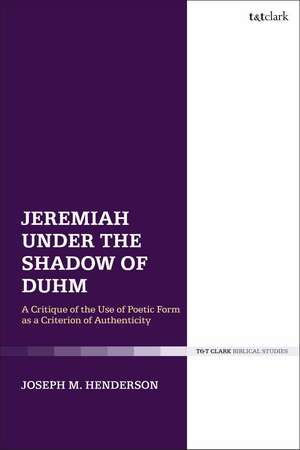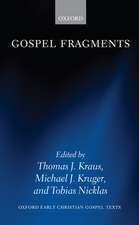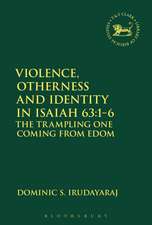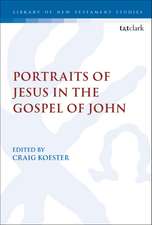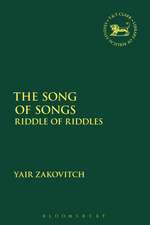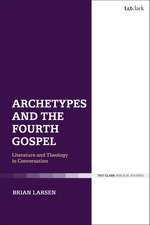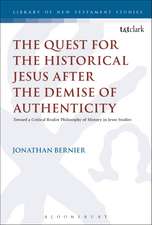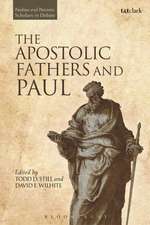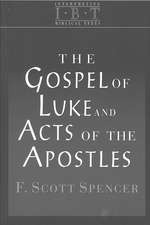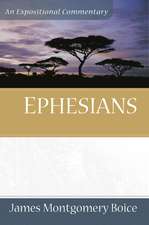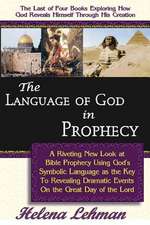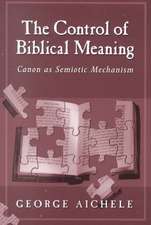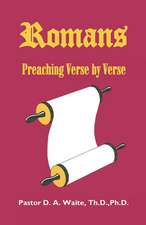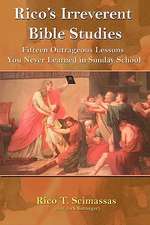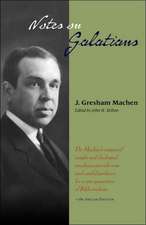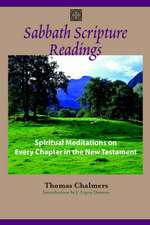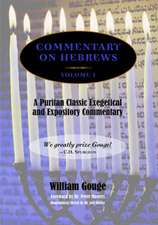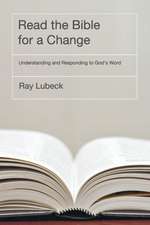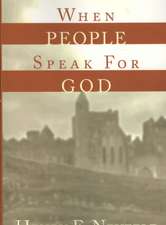Jeremiah Under the Shadow of Duhm: A Critique of the Use of Poetic Form as a Criterion of Authenticity
Autor Joseph M. Hendersonen Limba Engleză Hardback – 13 noi 2019
| Toate formatele și edițiile | Preț | Express |
|---|---|---|
| Paperback (1) | 221.84 lei 6-8 săpt. | +76.48 lei 7-13 zile |
| Bloomsbury Publishing – 28 iul 2021 | 221.84 lei 6-8 săpt. | +76.48 lei 7-13 zile |
| Hardback (1) | 835.11 lei 3-5 săpt. | |
| Bloomsbury Publishing – 13 noi 2019 | 835.11 lei 3-5 săpt. |
Preț: 835.11 lei
Preț vechi: 1199.36 lei
-30% Nou
Puncte Express: 1253
Preț estimativ în valută:
159.79€ • 166.84$ • 132.25£
159.79€ • 166.84$ • 132.25£
Carte disponibilă
Livrare economică 15-29 martie
Preluare comenzi: 021 569.72.76
Specificații
ISBN-13: 9780567676467
ISBN-10: 0567676463
Pagini: 400
Dimensiuni: 156 x 234 x 29 mm
Greutate: 0.68 kg
Editura: Bloomsbury Publishing
Colecția T&T Clark
Locul publicării:London, United Kingdom
ISBN-10: 0567676463
Pagini: 400
Dimensiuni: 156 x 234 x 29 mm
Greutate: 0.68 kg
Editura: Bloomsbury Publishing
Colecția T&T Clark
Locul publicării:London, United Kingdom
Caracteristici
Demonstrates that Jeremiah 2-10 and 11-20 are unified literary creations characterized by dramatic presentation and narrative progression
Notă biografică
Joseph M. Henderson is Associate Professor of Old Testament in the Torrey Honors College at Biola University, Los Angeles, USA.
Cuprins
Introduction: The Road to DuhmPart I: The Roots of Duhm: The Historical Origins of Duhm's ModelChapter 1: Introduction to Duhm's 1901 Das Buch JeremiaChapter 2: The Roots of Duhm's Understanding of Poetry and ProphecyChapter 3: The Roots of Duhm's Biography of the ProphetChapter 4: The Roots of Duhm's History of Israel's ReligionPart II: The Fruits of Duhm: The Standard Form of Duhm's Model in the Twentieth CenturyChapter 5: Skinner's Biography of the ProphetChapter 6: Mowinckel's Theory of the Composition of the BookPart III: Moving Beyond Duhm: Discerning the Coherence in Jeremiah 2-20Chapter 7: Rhetorical Critics and Jeremiah 2-10Chapter 8: Redaction Critics and Jeremiah 11-20Chapter 9: Dramatic Portrayal and Narrative Coherence in Jeremiah 2-10 and 11-20Epilogue: Pete Diamond and the Voice of YahwehBibliography
Recenzii
Henderson's book is a strong work that demonstrates successfully how the assumptions and aims of Duhm's approach influenced Jeremiah scholarship in the twentieth century and affect research in the early twenty-first century. Henderson's book is the most comprehensive critique of the dominant paradigm of Jeremiah studies that Duhm initiated. Furthermore, Henderson's notion of dramatic presentation is a welcome contribution to Jeremiah scholarship since it opens a new avenue to explore further the nature of the book's unity and coherence.
Henderson's book is the product of his lifelong study of Jeremiah. His arguments are carefully crafted and cogently presented. This is an important work that advances the debate among scholars regarding the composition of the book of Jeremiah.
Jordan M. Henderson's book, Jeremiah under the Shadow of Duhm, is a thorough investigation into the history of scholarship on the book of Jeremiah ... an invaluable book for understanding the origins and undertones of 20th century textual scholarship on the book of Jeremiah, and it presents a viable interpretation of how the present form of the book is to be understood.
[It] remains a milestone ... [as a] reference with which to confront ... the exegetical study on Jeremiah.
For over twenty years Joseph Henderson has immersed himself in the book of Jeremiah, its text, its setting, its scholarly problems, probing the strange and bruising power this book exerts over its readers. In this study he unearths a crucial assumption that has shaped over a century's critical analysis of this book. Henderson's critique arises not from a distaste for historical criticism, but from the recognition that accepted conventional wisdom has barred the way to deeper understanding. His critique of the central assumptions underlying Jeremiah scholarship is effective and thoughtful. The proposals he offers in its place are fruitful and even programmatically bold. This book is the end of 'business as usual' in Jeremiah studies.
Joseph Henderson shows how Duhm's watershed work on Jeremiah was decisively influenced by approaches to poetry and literature in the Britain and Germany of his day. The study issues a comprehensive demolition job on the presuppositions of a century of Jeremianic criticism, for which he suggests an intriguing alternative.
Henderson's book is the product of his lifelong study of Jeremiah. His arguments are carefully crafted and cogently presented. This is an important work that advances the debate among scholars regarding the composition of the book of Jeremiah.
Jordan M. Henderson's book, Jeremiah under the Shadow of Duhm, is a thorough investigation into the history of scholarship on the book of Jeremiah ... an invaluable book for understanding the origins and undertones of 20th century textual scholarship on the book of Jeremiah, and it presents a viable interpretation of how the present form of the book is to be understood.
[It] remains a milestone ... [as a] reference with which to confront ... the exegetical study on Jeremiah.
For over twenty years Joseph Henderson has immersed himself in the book of Jeremiah, its text, its setting, its scholarly problems, probing the strange and bruising power this book exerts over its readers. In this study he unearths a crucial assumption that has shaped over a century's critical analysis of this book. Henderson's critique arises not from a distaste for historical criticism, but from the recognition that accepted conventional wisdom has barred the way to deeper understanding. His critique of the central assumptions underlying Jeremiah scholarship is effective and thoughtful. The proposals he offers in its place are fruitful and even programmatically bold. This book is the end of 'business as usual' in Jeremiah studies.
Joseph Henderson shows how Duhm's watershed work on Jeremiah was decisively influenced by approaches to poetry and literature in the Britain and Germany of his day. The study issues a comprehensive demolition job on the presuppositions of a century of Jeremianic criticism, for which he suggests an intriguing alternative.
